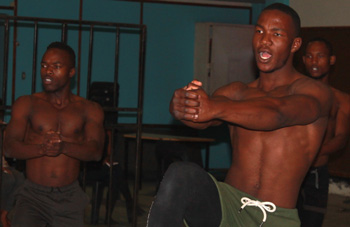
The Dark Knight Rises
Director: Christopher Nolan
Screenplay: Christopher and Jonathan Nolan
Players: Christian Bale; Morgan Freeman; Michael Caine; Anne Hathaway; Marion Cotillard;
Gary Oldman
Genre: Fantasy; science-fiction; adventure; action
Rating: ****
The action commences eight years after the death of Harvey Dent, the District Attorney who was crooked but was allowed by those in power – Batman and The Police Commissioner – to become revered as a hero for thwarting the power of The Joker and for the establishment of a prison in which to incarcerate over a thousand of Gotham’s worst criminals. Batman has disappeared and so has Bruce Wayne, who has become a disillusioned and physically weak recluse, limping around his private apartments in a dressing gown. This film may be science fiction but it is also a powerful indictment of the level of corruption and venality of western civilisation today. Capitalists and power-brokers are greedy and dishonest; organised crime is brazen and rapacious; the average citizen is a powerless pawn in a game for thieves at every level of society.
The film starts with a series of cross- cutting scenes which powerfully exemplify this dichotomy – between the average ignorant civilians on one hand and the sophisticated level of crime on the other. Commissioner Gordon (Oldman) is giving a speech in which he praises Dent with emphatic statements such as ‘I knew Harvey Debt; I believed in Harvey Dent’. As he mouths the words, he tucks the truth (which has been typed over several pages of a speech that he is not going to give) into the breast pocket of his jacket. This orderly gathering of decent citizens, lapping up the lies, is cross-cut with criminal activity in the skies, in which hooded prisoners are thrown out of an aeroplane which is eventually hooked on to another plane as part of a hi-jack exercise, at the end of which the plane is broken into pieces by air pressure.
Batman is reviled by our honest average citizens, believing as they do that Batman was responsible for the death of Dent. He has not made a public appearance since then. Selina Kyle, aka Cat Woman (Hathaway), however, posing as a maid, gains entrance to the Wayne Mansion and delivers Batman’s modest supper to his apartment retreat, using the opportunity to steal Bruce Wayne’s mother’s priceless pearls. This petty theft arouses Batman’s interest in the outside world.
Wayne’s personal retainer (Caine) then tells him that there is ‘Nothing at Gotham except pain and tragedy’. This is news to Bruce Wayne, who has spent eight years in painful and cynical introspection, believing sincerely that Gotham is better off without him. He is a soul in torment, still not spiritually healed after witnessing the violent assassination of his parents in his childhood. His childhood female friend had been killed violently by the Joker at the end of ‘The Dark Knight’ so Batman is all gloom and doom. So much so, in fact, that he has not registered the fact that Wayne Enterprises is failing to make profit and that various charitable enterprises such as St Swithin’s Orphanage has not received the Wayne donation for the last two years.
Here is a film with a simple message about orphans, in fact. The arch-villain, Bain, is allegedly an orphan born into the most notorious prison on the planet; Batman himself suffered from a lack of parental support in his formative years; and Policeman Robin Blake, now an adult serving in the Gotham police, recognises the anger in Bruce Wayne of someone denied the nurturing benefits of parents because he shares the same anger, ‘angry in your bones’ as he describes it, but he has learned well the advantages of disguising this with smiles.
As Wayne and Blake size up each other’s complexes, Bain is organising a formidable underground army in the sewers, from whence most of his soldiers originally sprang – well, the gutters, anyway – allow me leeway for hyperbole.
Wayne is physically weak now and spiritually bereft. He is the classic anti-hero. As in Batman Begins, the first Nolan film, he learns only through pain and suffering. Rigorous and painful exercise together with tasks to focus mind control are the only paths open to Batman to resume his former position of prominence. His butler tells him, ‘The city needs Bruce Wayne; it needs your resources, not your body.’ Meanwhile, Bain and his thugs shoot up the stock Exchange to gain direct access to the online trading desk. In this they are successful in impoverishing Wayne Enterprises, with its bloated Board of Directors.
Thus the plot begins. Gotham, however, is a thinly-disguised portrait of New York today. Numerous aerial views of skyscraper city, Manhattan, and a quick frame of Sax on Fifth Avenue suggest that Nolan made no attempt to disguise it. Nolan’s film is a powerful action film, pitched and balanced perfectly: no violent excesses to perk up a tired plot or there merely to titillate a few nerve-endings. Gotham ceases to be a comic-book nightmare of the future; it becomes a realistic depiction of the here-and-now: the film indicates all too clearly the thin veneer of civilisation, open always to abuse by megalomaniacs, exploited always by venal capitalists, pecked at continuously by petty crime. ‘There is something rotten in the state of Denmark,’ muses Shakespeare’s Hamlet, and I am surprised that Batman did not ape the same sentiment.












































